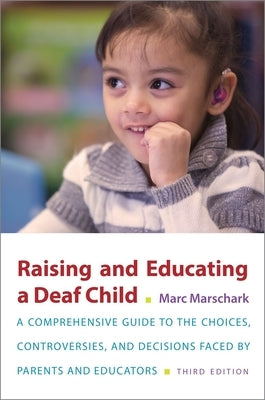Description
Deaf children are not hearing children who can't hear, and having a deaf child is not analogous to having a hearing child who can't hear. Beyond any specific effects of hearing loss, deaf children are far more diverse than their hearing age-mates. A lack of access to language, limited
incidental learning and social interactions, as well as the possibility of secondary disabilities, mean that deaf children face a variety of challenges in language, social, and academic domains. In recent years, technological innovations such as digital hearing aids and cochlear implants have improved hearing and the possibility of spoken language for many deaf learners, but parents, teachers, and other professionals are just now coming to recognize the cognitive, experiential, and
social-emotional differences between deaf and hearing children. Sign languages and schools and programs for deaf learners thus remain an important part of the continuum of services needed for this population. Understanding the unique strengths and needs of deaf children is the key. Now in its third edition, Marc Marschark's Raising and Educating a Deaf Child, which has helped a countless number of families, offers a comprehensively clear, evidence-based guide to the choices, controversies, and decisions faced by parents and teachers of deaf children today.
Author: Marc Marschark
Publisher: Oxford University Press, USA
Published: 11/30/2017
Pages: 296
Binding Type: Paperback
Weight: 0.92lbs
Size: 9.10h x 6.10w x 0.80d
ISBN13: 9780190643522
ISBN10: 0190643528
BISAC Categories:
- Family & Relationships | Children with Special Needs
- Psychology | Developmental | Child
- Social Science | People with Disabilities
incidental learning and social interactions, as well as the possibility of secondary disabilities, mean that deaf children face a variety of challenges in language, social, and academic domains. In recent years, technological innovations such as digital hearing aids and cochlear implants have improved hearing and the possibility of spoken language for many deaf learners, but parents, teachers, and other professionals are just now coming to recognize the cognitive, experiential, and
social-emotional differences between deaf and hearing children. Sign languages and schools and programs for deaf learners thus remain an important part of the continuum of services needed for this population. Understanding the unique strengths and needs of deaf children is the key. Now in its third edition, Marc Marschark's Raising and Educating a Deaf Child, which has helped a countless number of families, offers a comprehensively clear, evidence-based guide to the choices, controversies, and decisions faced by parents and teachers of deaf children today.
Author: Marc Marschark
Publisher: Oxford University Press, USA
Published: 11/30/2017
Pages: 296
Binding Type: Paperback
Weight: 0.92lbs
Size: 9.10h x 6.10w x 0.80d
ISBN13: 9780190643522
ISBN10: 0190643528
BISAC Categories:
- Family & Relationships | Children with Special Needs
- Psychology | Developmental | Child
- Social Science | People with Disabilities
About the Author
Marc Marschark is a Professor at the National Technical Institute for the Deaf, a college of Rochester Institute of Technology, where he directs the Center for Education Research Partnerships. His primary interest is in relations among language, learning, and cognition; current research focuses on such relations among deaf children and adults in formal and informal educational settings.

